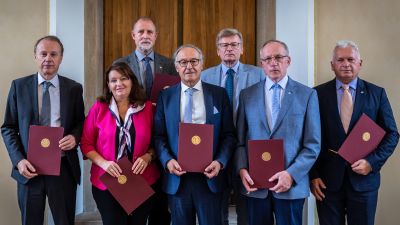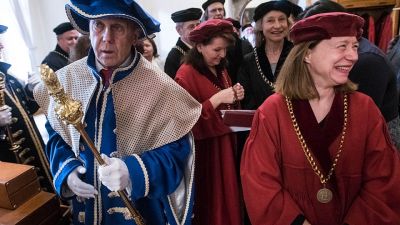This Tuesday, Charles University welcomed a delegation from the public research University of Passau in neighbouring Germany, a shared effort to deepen existing ties and establish plans for future cooperation. The work meeting showed that there are numerous areas, from computer science and IT to economics and other fields in the Humanities, where the schools could benefit and build on either already existing frameworks or introduce new tools providing new opportunities. For postdocs, PhD, or Masters students and even the private sector.

University of Passau President Ulrich Bartosch and CU Rector Milena Králíčková talk at the start of their meeting in Prague on 30 May 2023.
Kicking off proceedings, CU Rector Milena Králíčková welcomed the University of Passau’s president and fellow representatives, before quickly getting down to brass tacks. Representatives from both schools made brief introductions before outlining ways in which their respective universities and individual faculties already cooperate when it comes to joint programmes, double degrees, Erasmus exchanges or postdoc stays, while Rector Králíčková also brought up the modules known as micro-credentials which the CU rector and her team have gotten behind. Milena Králíčková:
“This is something that resonates in my team and which we are asking faculties to explore and that is the need of a much wider ability to offer much more in terms of lifelong learning in education especially in fields such as computer science and AI. What we need, and what I think Europe really needs, is an upskilling of people even beyond schools and [present-day students]. Without it, Europe will not stay as competitive with the rest of the world. Micro-credentials are [a European instrument] being advanced by the EC to EU member states but not all picked up as a lifelong learning tool [ie. more units or modules - ed. note] which should be developed among more universities and even business partners.”
In his opening remarks, University of Passau President Ulrich Bartosch explained that the moment was ripe for the schools to get closer and take a chance on deeper cooperation including joint-study programmes and dual (or double) degrees. He elaborated later in a brief interview for Forum:
“Our school is a small Bavarian university which is not as old but we have shared a good relationship from the start and it is great to be here at Charles University. It’s time now though to foster some of our programmes and lead in a new area. Europe is changing very quickly at the moment and it is a good thing to think together about special programmes to establish in the fields of informatics and maths and classic areas of study like history. We are on the way already and I was very glad to meet in person with Rector Králíčková. Hopefully we will be able to move ahead.”
Forum: There are already existing frameworks that can prove useful but I guess there are also promising new areas to explore, as well?
“Of course. I am thankful the rector brought up the possibility of micro-credentials ,which are a much easier step to get in on or on board with, and I am thankful that she and is pushing for them. I will ask our colleagues also to look into that. This is a combination of efforts, whether we are talking about double degree or micro-credentials… We could come up with some very interesting offers between our schools.”
Earlier, Rector Milena Králíčková suggested that CU was well-positioned, well in advance, to get in on the veritable 'ground floor' when it came to micro-credentials:
“In the Czech Republic the ground for the system have largely been prepared and Charles University leads the national project and next year we will have a nationwide system in place. That includes a blockchain system to store micro-credentials and a website where all of our universities will feature or advertise the possibility of micro-credentials not only for students but all European citizens… I believe it is our task as a university to prepare for that, using even structural funds we still have, to prepare a system which could be used by faculties available not only to students but also to the [broader public and private sector]. I think we need to prepare for that. There is more flexibility than with joint-study programmes. Upskilling people in our joint regions [in Czechia and Germany] is an idea.”
The rector is herself a native of west Bohemia, familiar with regional connections across borders; micro-credentials are seen as a potential very useful tool to improve knowledge and skills through short courses or training.
Micro-credentials are one thing, another is the opportunity to study at multiple universities in combination to equal a double degree: such a degree was displayed during the meeting as evidence of other areas students are gaining more benefits and taking advantage of offers to gain hands-on and international experience, raising their credentials to be even more competitive on today’s market.
Tomáš Skopal, CU’s Vice-Rector for Information technology, discussed elements such as study programmes and the double degree as 'puzzles' in which all parts fall into place ie. you can study at several different schools as the foundation for your degree.
Jan Polák, CU’s Vice-Rector for the Conception and Quality of Education, said such study met the raison d'être or goal within the European project, while adding that CU had experience in overcoming a host of challenges that made the implementation of double diplomas difficult.
“The joint or double diploma is really a mainstay of joint European programmes and we are well-prepared in this area, including within European alliances like 4EU+, to delete obstacles to make so that anyone can get this kind of degree. We put a lot into making progress in that and that should help in our cooperation.”






















